
Like humans, cats can get anxious when they’re in a new or unfamiliar environment. If you’ve recently adopted a cat whose exhibiting signs of anxiety and you’re not sure where to start in reducing it, then try our tips to help make them more comfortable in their new environment.
Understand their psychology
Cats are sensitive creatures who can easily be scared by their environment or even a new person in the house. Their instincts often tell them that something’s wrong, but they don’t know what it is exactly.
This being said, there are many things that could make your kitty nervous: loud noises; new people or animals coming into the house; heavy footsteps; objects moving around (cats love consistency)… The list goes on! Try to understand what may be causing your cat to feel anxious and figure out if it’s any specific thing in their home environment that’s affecting their behaviour and mood.
Provide a safe place
One of the main ways cats seek comfort is by hiding. Providing them with a hiding space or perching point that they can use as their sanctuary if they feel frightened is a great way to alleviate anxiety. Cats also like to sleep in dark, quiet places, so make sure your cat has enough darkness and quietness in its environment.
Keep them occupied and happy
If your cat is an indoor-only cat, they may not have the option to scratch outdoors. If you want to provide your cat with this natural behaviour, there are a few options:
- Cat scratchers – these are cardboard and/or carpeted homes for cats that they can use as their own personal scratching posts. Kmart sells plenty of affordable options!
- Toys – cats enjoy playing with toys of all kinds, including balls on strings or feathery toys that can be dangled in front of them. It’s important not to leave these lying around though because your cat may get bored of them quickly (reducing their value) and start chewing up other things in order to stay entertained (like furniture). If you’re having trouble finding toys that catch their interest for long periods of time, try ‘spray’ scented ones like vanilla extract or apple cider vinegar; cats tend to react strongly towards these smells, so it’ll keep them occupied longer than other types would.
Maintain a good feeding schedule
Cats can experience hanger just like us humans do! So it’s important to have a schedule for feeding your cat, so that it doesn’t feel hungry at odd times and lash out in fear. If your cat is upset about something, it will be more likely to lash out if it’s hungry.
Spend time with them!
While you may not have time to play with your cat every day, it’s important to ensure they have a daily period of interaction. The more often you spend time with your cat, the stronger the bond will be between the two of you and the more secure your cat will feel. Playtime has numerous benefits for both you and your cat:
- Socialization – Cats are solitary animals by nature and need an outlet for their hunting instincts. Playing with them will allow them to relax in social situations and get exercise at the same time!
- Mental stimulation – Cats also benefit from mental stimulation when they’re playing, which helps keep them sharp as they age (and also provides relief from stress).
- Physical exercise – You’ll notice how much happier and healthier cats become after getting regular exercise throughout their lives. This applies even more so when they’re young – a tired kitty is a happy kitty!
- Bonding – Spending quality bonding time together helps strengthen relationships between humans and pets alike.
Don’t forget to let them wind down, too
After you’ve played with your cat, let them wind down and relax by petting them for a few minutes. You might want to use a soft and gentle voice as well, if you find that’s helpful for your cat.
You should always make sure that when you’re petting your cat that you’re not too rough or aggressive about it. If you pet them too hard or in an aggressive way, this will only cause more stress!
Try some home remedies
If your cat continues to act skittish or seems to be confused, you can try some of this home-remedies and see if they work:
- If your cat is scared of loud noises, you can use a white noise machine to drown out the sound.
- You could also try playing music that they enjoy in order to distract them from whatever they are afraid of.
- If your cat is afraid of strangers and other animals, it may be best for you not to let them outside without supervision until they calm down.
If you notice that your cat tends towards aggressive behaviour when dealing with other pets or people, it might be time for some professional intervention in order to help manage their anxiety levels better.
We know it can be hard to deal with an anxious cat, but thankfully there are many ways you can help them feel more comfortable in your home. If you follow our tips and make a few changes to the environment, your kitty will be happy and relaxed in no time!
